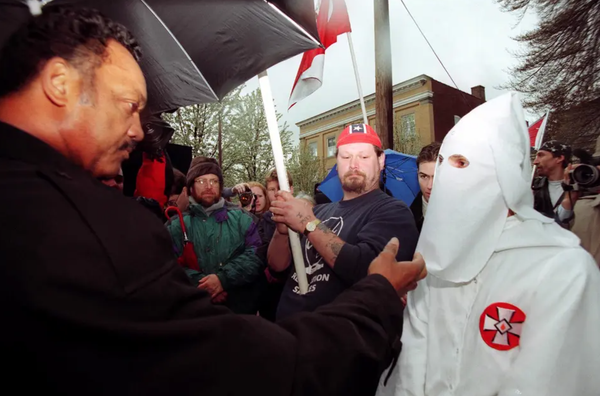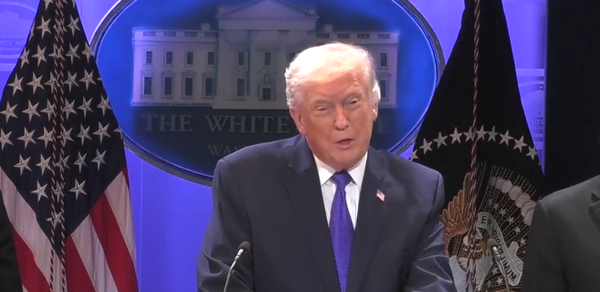Trump Concedes He's Illegitimate
It was an accident, surely.

*****JOIN TODAY TO GET HALF OFF!*****
Today’s Editorial Board goes out to everyone.
If you missed previous editions, now’s the time to subscribe!
Do it now and GET 50% OFF!
(Just follow the directions after clicking the red button ↓.)
Many thanks! —JS
Donald Trump admitted today that Russia helped him win the 2016 presidential election. I don’t think he meant to confess. I think he meant to blast critics, discredit Robert Mueller and defend against the encroaching forces of impeachment.
But in the process, the president ended up saying out loud what a lot of us knew already. Even better, Trump said later this morning that he didn’t say what he said. In “walking back” his accidental confession, he confirmed he understands its deep political significance. He can’t afford arousing suspicion that he’s illegitimate.

We should thank the president.
After Mueller spoke for the first time in years, the issue of legitimacy was lost largely. This, I’d say, is understandable. Most of us are focused on criminality. Mueller said he couldn’t indict a sitting president, but couldn’t say Trump didn’t obstruct justice. In Mueller’s view, that’s not up to him. That’s up to the United States Congress.
But the issue of legitimacy was equally important to his statement. Mueller began and ended saying our country was attacked, the goals being to undermine the integrity of the 2016 election, and to “damage a presidential candidate.” What does that have to do with Trump’s legitimacy? These are the dots most people have not yet connected. It’s my hope that Trump’s confession spurs more people into connecting them.
It’s true that the Russians sabotaged Hillary Clinton. (To see how they did that, go here.) It follows logically that anything that hurt Clinton’s campaign was going to help Trump’s, because there were just two people in the race. So when Mueller says the Russians sought to “damage a presidential candidate,” he’s saying without saying the Russians helped Trump win. The Republicans understand this means illegitimacy. Efforts to cover it up have been as “sweeping and systemic” as the sabotage itself.
Why did Trump say his chief fear out loud?
Some follow the president’s lead, doing whatever they can to discredit Mueller’s reputation and his investigation’s findings. Some are so shameless they wade into the sewer of conspiracy theory, alleging the Democrats are the true villains.
Others are more nuanced. Those who still value their reputations as patriots concede the Russians violated our sovereignty but stop short of saying they helped Trump. They talk of the need for “election security,” which means protecting voting systems from hackers, but not for stopping the Kremlin’s propaganda. Nor do they acknowledge the Kremlin and the GOP share an enemy: the Democratic Party.
There’s a good reason for this. If more Americans understood more clearly that Donald Trump did not win on his own, that his rival was kneecapped, that the Russians abetted his campaign … well, things might be different. True, this president is about as unpopular as any has been. It might be hard to imagine there being more room for being less popular (not with the economy performing well enough). Still, it could be worse. A lot worse. I cite as evidence none other than the president himself.
A long time ago, after we discovered that Vladimir Putin has personally ordered government agents to influence public opinion, to set it against Hillary Clinton, we learned about Trump’s chief fear. From the July 18, 2018, edition of the Times:
In the run-up to this week’s ducking and weaving, Mr. Trump has done all he can to suggest other possible explanations for the hacks into the American political system. His fear, according to one of his closest aides who spoke on the condition of anonymity, is that any admission of even an unsuccessful Russian attempt to influence the 2016 vote raises questions about the legitimacy of his presidency (my italics).
Why did Trump say his chief fear out loud? Hard to say, but it’s probably the TV.
Seeing Robert Mueller speak on all the networks, saying without saying that the president committed crimes, saying without saying that the Congress should commence impeachment, probably got into Trump’s head. It got into his head so much he ended up saying the worst thing he could say about himself. And we know he knows it’s the worst thing he could say, because he denied saying it immediately.
So we should thank the president.
We should thank him for bringing our attention back to presidential legitimacy. Moreover, we should thank him for clarifying the meaning of collusion. Collusion, after all, isn’t a complex matter of conspiracy to commit a crime. Collusion is much, much simpler than that, so simple that anyone can understand it. It means this:
The Kremlin helped Trump win.
And he never refused its help.
—John Stoehr




